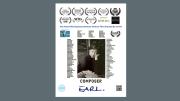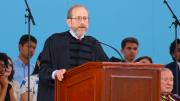Gloria: A Life, at the American Repertory Theater January 24-March 1, is not a biopic. Instead, playwright Emily Mann ’74 and director Diane Paulus ’88 use the pioneering feminist’s iconic and personal journey to tell the wider, collective story of the modern women’s movement.
The play is based on Mann’s research and interviews with Steinem, now 85, and was first produced off-Broadway in late 2018. It touches on Steinem’s journalistic exploits—New York magazine columnist, co-founder of Ms. magazine—and the challenges, like family instability and sexism, that she faced and has chronicled. Her rise during the 1960s and ’70s as the glamorous spokeswoman for women’s rights, however, is not spelled out. Steinem the character (played by Patricia Kalember, of the Manhattan production) appears on stage more to illuminate and punctuate a story that includes a cast of other landmark figures who rotate through scenes, animating history—among them former New York congresswoman and crusader for liberal causes Bella Abzug, radical African-American activist Angela Davis, and constitutional lawyer and antifeminist conservative leader Phyllis Schlafly, A.M. ’45. (Their presence may make the play especially useful for younger women.) Steinem’s mother, Ruth, a fragile, mentally ill woman whom Steinem has said was instrumental in shaping her views on social injustices and anti-women practices, looms large—and poignantly so.
Steinem has promoted the “talking circle” as a method for airing volatile issues. In the play’s second act, a talking circle actually takes place on stage, and audience members are invited to participate. In many ways, Mann’s play can be seen as a talking circle writ large, reflecting not only institutionalized feminism, but the organic, continuous movement of women.









